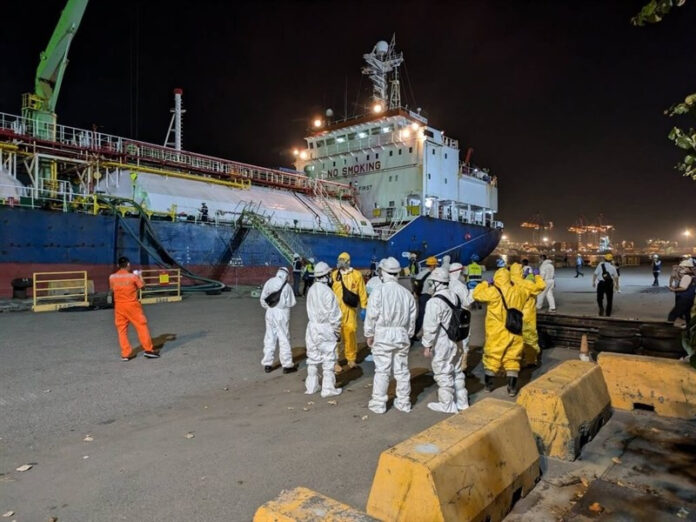Taiwan’s Ministry of the Environment (MOENV) has imposed a NT$3 million fine on the owner of an Indonesian tanker responsible for a vinyl chloride leak at the Port of Taipei. The incident, which occurred after the vessel unloaded its cargo, caused the release of a carcinogenic gas into the air, prompting environmental and legal actions.
Details of the Vinyl Chloride Leak Incident
In August 2024, an Indonesian tanker was flagged at the Port of Taipei for malfunctioning equipment. The vessel returned to the port in October, and environmental authorities detected elevated levels of vinyl chloride—a toxic, flammable gas primarily used in the production of PVC (polyvinyl chloride).
According to Chang Shun-chin, head of the MOENV’s Department of Atmospheric Environment, the leak occurred due to the ship’s failure to properly purge vinyl chloride residues from its pipeline. After unloading its cargo, the vessel did not use the required pressurized nitrogen to clear the pipeline that connected the ship to the port’s storage cylinders. This failure allowed vinyl chloride to escape into the air, initially blowing towards the sea before drifting towards a nearby residential area, potentially posing a health risk to the local population.
Prosecutorial Actions and Fines
Following a thorough investigation by the Shilin District Prosecutors Office, it was confirmed that the leak was the result of negligence. As a result, the office decided to defer prosecution against the ship’s captain and first mate, provided they each pay a combined NT$13 million in fines. In addition, the vessel’s owner was fined NT$3 million for violations of Taiwan’s Air Pollution Control Act.
The exact identity of the tanker and its owner has not been disclosed by Taiwanese media, but photographs of the ship suggest that it may belong to Soechi Lines, a Jakarta-based shipping company.
Environmental Impact and Legal Consequences
The vinyl chloride leak raised concerns about air pollution and potential health risks to nearby residents. Vinyl chloride is classified as a carcinogen, and prolonged exposure to the gas can cause significant health problems. Although the incident was contained, it highlights the importance of maintaining strict environmental safety protocols in port areas.
The MOENV’s swift response underscores the government’s commitment to enforcing environmental regulations and ensuring public safety. The fine against the ship’s owner is a clear message that negligent behavior leading to pollution will not be tolerated.
Table: Key Details of the Incident
| Event | Details |
|---|---|
| Date of Leak | October 2024 |
| Location | Port of Taipei |
| Chemical Involved | Vinyl chloride (carcinogen used in PVC production) |
| Fine Imposed | NT$3 million on ship owner, NT$13 million combined on captain and first mate |
| Environmental Violation | Failure to properly purge pipeline, causing vinyl chloride to leak into the air |
| Company Involved | Soechi Lines (tentative based on ship photos) |
| Investigation Authority | Ministry of the Environment, Shilin District Prosecutors Office |
Frequently Asked Questions (FAQs)
Q: What is vinyl chloride, and why is it dangerous?
A: Vinyl chloride is a carcinogenic gas used in the production of PVC. Long-term exposure can lead to serious health issues, including cancer.
Q: What caused the leak at the Port of Taipei?
A: The leak occurred because the tanker failed to use pressurized nitrogen to clear vinyl chloride residues from its pipeline, which then escaped into the air.
Q: What actions were taken against the ship’s crew?
A: The captain and first mate were fined a combined NT$13 million, and prosecution was deferred pending payment.
Q: How much was the fine imposed on the ship’s owner?
A: The owner of the ship was fined NT$3 million for violating Taiwan’s Air Pollution Control Act.
Q: Which company owns the tanker involved in the incident?
A: Although not officially confirmed, media reports and photos suggest the tanker may belong to Soechi Lines, a company based in Jakarta, Indonesia.
Impact on Port Operations and Future Safety
Following the incident, local authorities have called for stricter enforcement of environmental regulations in port areas. This incident has brought attention to the importance of proper cargo handling and pollution prevention measures to protect both public health and the environment.
In the future, stricter inspection protocols and regular checks of ship equipment could be enforced to prevent similar occurrences, ensuring that the Port of Taipei remains a safe and environmentally responsible hub for international trade.
